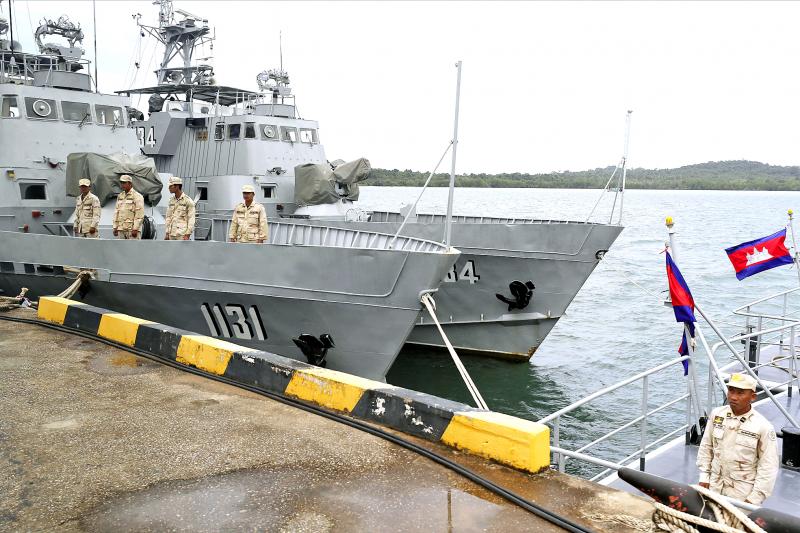A Cambodian naval base being constructed with the assistance of China is to include a portion for the exclusive use of the Chinese military, the Washington Post reported yesterday.
The Chinese and Cambodian governments have previously denied reports that Cambodia would allow a Chinese military presence at the Ream Naval Base on the Gulf of Thailand.
Such a presence would mark a significant expansion in China’s military access in the Indo-Pacific region, where it currently only has one naval base, in the east African nation of Djibouti.

Photo: AP
Citing unnamed Western and Chinese officials, the Post reported that the base would host the Chinese military in its northern section.
One Western official told the paper that expansion plans finalized in 2020 called for the Chinese military to have “exclusive use of the northern portion of the base, while their presence would remain concealed.”
A Beijing official confirmed the Chinese military would use a “portion” of the base, but denied it would have exclusive use.
Lowy Institute international security program director Sam Roggeveen said the new information, and particularly the apparent confirmation by a Beijing official, “strengthens the case that this is actually happening.”
“It’s fairly early days, so we don’t know what the capacity of the facility will be,” Roggeveen said. “Its practical value [to Beijing] is that it would allow China to deploy more readily its warships and coastguard vessels around the region, and to simply have a bit more presence, where once it would need to sail very long distances.”
Australian Prime Minister Anthony Albanese, who was visiting Indonesia yesterday, said he was concerned about the reports and called on the Chinese government to be open about its intentions.
“We are in regular contact with the Cambodian government and we have been consistently assured that no foreign military will be granted exclusive access at Ream,” Albanese told reporters in Makassar. “We’ve been aware of Beijing’s activity at Ream for some time. We encourage Beijing to be transparent about its intent, and to ensure that its activities support regional security and stability.”

INVESTIGATION: The case is the latest instance of a DPP figure being implicated in an espionage network accused of allegedly leaking information to Chinese intelligence Democratic Progressive Party (DPP) member Ho Jen-chieh (何仁傑) was detained and held incommunicado yesterday on suspicion of spying for China during his tenure as assistant to then-minister of foreign affairs Joseph Wu (吳釗燮). The Taipei District Prosecutors’ Office said Ho was implicated during its investigation into alleged spying activities by former Presidential Office consultant Wu Shang-yu (吳尚雨). Prosecutors said there is reason to believe Ho breached the National Security Act (國家安全法) by leaking classified Ministry of Foreign Affairs information to Chinese intelligence. Following interrogation, prosecutors petitioned the Taipei District Court to detain Ho, citing concerns over potential collusion or tampering of evidence. The

‘FORM OF PROTEST’: The German Institute Taipei said it was ‘shocked’ to see Nazi symbolism used in connection with political aims as it condemned the incident Sung Chien-liang (宋建樑), who led efforts to recall Democratic Progressive Party (DPP) Legislator Lee Kun-cheng (李坤城), was released on bail of NT$80,000 yesterday amid an outcry over a Nazi armband he wore to questioning the night before. Sung arrived at the New Taipei City District Prosecutors’ Office for questioning in a recall petition forgery case on Tuesday night wearing a red armband bearing a swastika, carrying a copy of Adolf Hitler’s Mein Kampf and giving a Nazi salute. Sung left the building at 1:15am without the armband and apparently covering the book with a coat. This is a serious international scandal and Chinese

Seventy percent of middle and elementary schools now conduct English classes entirely in English, the Ministry of Education said, as it encourages schools nationwide to adopt this practice Minister of Education (MOE) Cheng Ying-yao (鄭英耀) is scheduled to present a report on the government’s bilingual education policy to the Legislative Yuan’s Education and Culture Committee today. The report would outline strategies aimed at expanding access to education, reducing regional disparities and improving talent cultivation. Implementation of bilingual education policies has varied across local governments, occasionally drawing public criticism. For example, some schools have required teachers of non-English subjects to pass English proficiency

TRADE: The premier pledged safeguards on ‘Made in Taiwan’ labeling, anti-dumping measures and stricter export controls to strengthen its position in trade talks Products labeled “made in Taiwan” must be genuinely made in Taiwan, Premier Cho Jung-tai (卓榮泰) said yesterday, vowing to enforce strict safeguards against “origin laundering” and initiate anti-dumping investigations to prevent China dumping its products in Taiwan. Cho made the remarks in a discussion session with representatives from industries in Kaohsiung. In response to the US government’s recent announcement of “reciprocal” tariffs on its trading partners, President William Lai (賴清德) and Cho last week began a series of consultations with industry leaders nationwide to gather feedback and address concerns. Taiwanese and US officials held a videoconference on Friday evening to discuss the